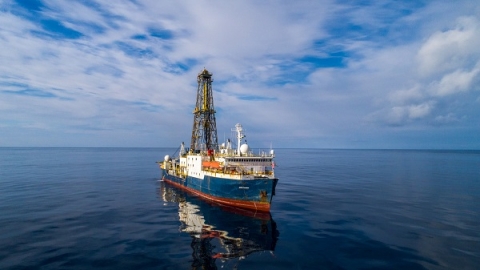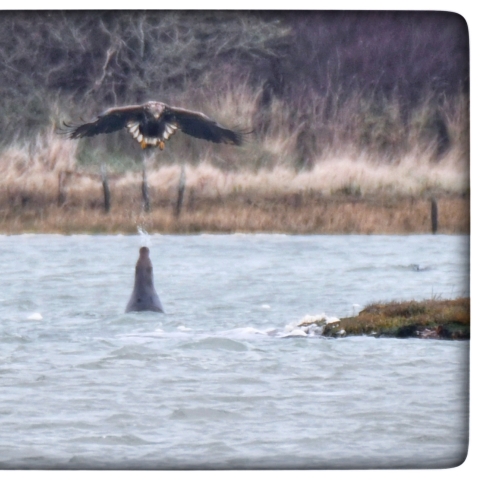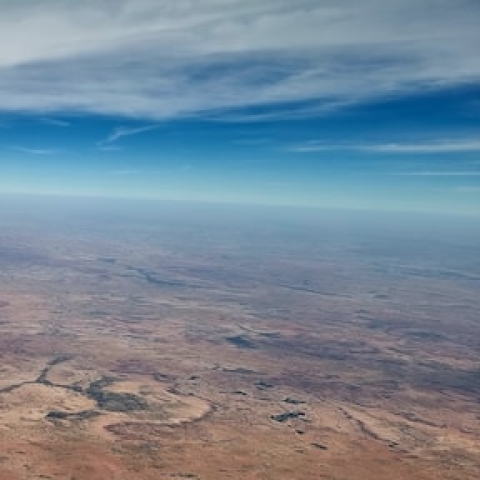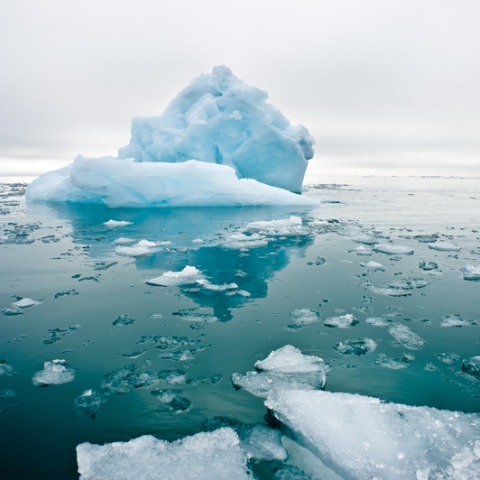

Southern Ocean sediment cores reveal climate-related fluctuations in the Antarctic Circumpolar Current throughout history.
27 March 2024
8
Research has shed light on the evolution of the Earth’s most powerful ocean engine, The Antarctic Circumpolar Current (ACC).
The ACC regulates our planet’s climate and temperature, by helping to transport heat, moisture, carbon, and nutrients between the Southern Ocean and other parts of the world, impacting atmospheric CO2 levels and global climate.
An international team, made up of scientists from several institutions including the University of Portsmouth, has now used sediments taken from the South Pacific to reconstruct the flow speed in the last 5.3 million years.
Their data, published in the journal Nature, shows that during glacial periods the current slowed, and during interglacials, it accelerated.
It suggests that if the current global warming intensifies in the future, it could mean that the Southern Ocean stores less CO2 and that more heat reaches Antarctica.
The ACC moves 100 times as much water as all the Earth’s rivers combined, measures 2,000 kilometres across at its widest point, and extends all the way down to the deep sea.
New findings gathered from sediment cores reveal this ocean current system was subject to substantial natural fluctuation in the past.
The sediment cores encompass three entire periods:
- The Pliocene, during which it was up to three degrees warmer than today and the atmospheric CO2 concentration, at more than 400 ppm, was similar to today’s levels.
- The Pleistocene, which began 2.6 million years ago and was characterised by alternating ice ages (glacials) and warm periods (interglacials).
- The Holocene, a warm period that began roughly 12,000 years ago, following the last ice age, and continues up to the present.
Colder phases in the Pliocene and subsequent Pleistocene periods, during which the ACC slowed, correlate to advances of the West Antarctic Ice Sheet. In warmer phases the ACC accelerated, accompanied by the retreat of the ice sheet.
The study was led by the Alfred Wegener Institute (Germany) and the Lamont-Doherty Earth Observatory, Columbia University (USA). Lead author, Dr Frank Lamy, from the Alfred Wegener Institute, Helmholtz Centre for Polar and Marine Research (AWI), said: “The ACC has a major influence on heat distribution and CO2 storage in the ocean. Until recently, it remained unclear how the ACC responds to climate fluctuations, and whether changes in the ACC offset or amplify the effects of warming.
“Therefore, to improve forecasts of our future climate and the stability of the Antarctic Ice Sheet using computer simulations, we need paleo-data that can tell us something about the intensity of the ACC in past warm phases in Earth’s history.”
The past is key to the future because understanding what happened in the past can help us to take the right climate-related actions.
Dr Mariem Saavedra-Pellitero, University of Portsmouth’s School of Environment, Geography and Geosciences
Co-author, Dr Mariem Saavedra-Pellitero from the University of Portsmouth’s School of Environment, Geography and Geosciences, added: “It is somehow surprising to know that the ACC slowed down during glacial times and became stronger during interglacials, exceeding at times the present or more recent average flow.
“This paper opens interesting questions, that constitute the main focus of my research, about the relevance of warmer-than-today intervals as future analogues. The past is key to the future because understanding what happened in the past can help us to take the right climate-related actions.”
To gather the data, in 2019 the International Ocean Discovery Program (IODP) expedition 383 ventured to the central South Pacific on board the drilling ship JOIDES Resolution.
There, in the Subantarctic Zone, the research team extracted several sediment cores at two drilling sites, gathered at a depth of around 3,600 metres.
They were preceded by extensive reconnaissance work done on various expeditions with the research vessel Polarstern, in which Dr Saavedra-Pellitero was also involved as micropalaeontologist.
Due to anthropogenic climate change, the study concludes, the ACC could grow stronger in the future. This could impact the CO2 balance of the Southern Ocean and lead to accelerated melting of Antarctic ice.
Dr Mariem Saavedra-Pellitero said: “I am thrilled to have a new PhD student starting at the University of Portsmouth in October 2024. The SO-WARM project will reconstruct past environmental conditions in the Southern Ocean using tiny algae called coccolithophores during selected warm interglacials."
More like this...
Caught on camera: grey seal spits at sea eagle in never seen before encounter
A grey seal has been seen spitting a jet of water at a sea eagle, a defensive behaviour that hasn’t been reported before, according to a new study from the University of Portsmouth.
5 March 2024
4 min read

Study calls for better inclusion of women in environmental decision making in Nigeria
31 October 2023
7

Experts warn Arctic is warming four times faster than the rest of the world
12 October 2023
7

